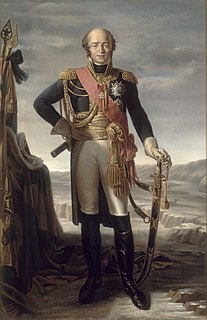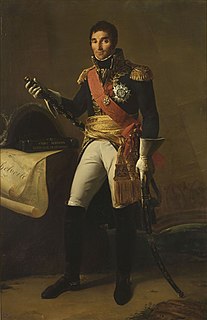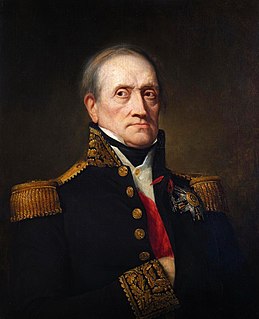 W
WMarshal of the Empire was a civil dignity during the First French Empire. It was created by Sénatus-consulte on 18 May 1804 and to a large extent resurrected the formerly abolished title of Marshal of France. According to the Sénatus-consulte, a Marshal was a grand officer of the Empire, entitled to a high-standing position at the Court and to the presidency of an electoral college.
 W
WCharles Pierre François Augereau, 1st Duke of Castiglione was a French military commander and a Marshal of the Empire who served during the French Revolutionary Wars and the Napoleonic Wars. After serving in the Revolutionary Wars, he earned rapid promotion while fighting against Spain and soon found himself as a division commander under Napoleon Bonaparte in Italy. He fought in all of Bonaparte's battles of 1796 with great distinction. During the Napoleonic Wars, Napoleon entrusted Augereau with important commands. His life ended under a cloud because of his poor timing in switching sides between Napoleon and King Louis XVIII of France. Napoleon wrote of Augereau that he "has plenty of character, courage, firmness, activity; is inured to war; is well liked by the soldiery; is fortunate in his operations.". Augereau is generally counted as one of the most capable generals of the Napoleonic Wars.
 W
WClaude Victor-Perrin, 1st Duke of Belluno was a French soldier and military commander who served during both the French Revolutionary Wars and the Napoleonic Wars. He was made a Marshal of the Empire in 1807 by Emperor Napoleon I.
 W
WLouis-Alexandre Berthier, 1st Prince of Wagram, Sovereign Prince of Neuchâtel, was a Marshal of the Empire doubling as Minister of War and chief of staff to Napoleon. Born into a military family, he served in the French Army and survived suspicion of monarchism during the Reign of Terror before a rapid rise in the ranks during the French Revolutionary Wars. Although a key supporter of the coup against the Directory that gave Napoleon supreme power, and present for his greatest victories, Berthier strongly opposed the progressive stretching of lines of communication during the Russian campaign. Allowed to retire by the restored Bourbon regime, he died of unnatural causes shortly before the Battle of Waterloo. Berthier's reputation as a superb operational organiser remains strong among current historians.
 W
WJean-Baptiste Bessières, 1st Duke of Istria, was a French military commander and Marshal of the Empire who served during both the French Revolutionary Wars and the Napoleonic Wars. His younger brother, Bertrand, followed in his footsteps and eventually became a divisional general. Their cousin, Julien Bessières, also served Emperor Napoleon I as a diplomat and imperial official.
 W
WGuillaume Marie-Anne Brune, 1st Count Brune was a French military commander, Marshal of the Empire, and political figure who served during the French Revolutionary Wars and the Napoleonic Wars.
 W
WCharles XIV John was King of Sweden and Norway from 1818 until his death. In modern Norwegian lists of kings he is called Charles III John. He was the first monarch of the Bernadotte dynasty.
 W
WLouis-Nicolas d'Avout, better known as Davout, 1st Duke of Auerstaedt, 1st Prince of Eckmühl, was a French military commander and Marshal of the Empire who served during both the French Revolutionary Wars and the Napoleonic Wars. His talent for war, along with his reputation as a stern disciplinarian, earned him the nickname "The Iron Marshal". He is ranked along with Marshals André Masséna and Jean Lannes as one of Napoleon's finest commanders. His loyalty and obedience to Napoleon were absolute. During his lifetime, Davout's name was commonly spelled Davoust - this spelling appears on the Arc de Triomphe and in much of the correspondence between Napoleon and his generals.
 W
WLaurent de Gouvion Saint-Cyr, 1st Marquis of Gouvion-Saint-Cyr was a French commander in the French Revolutionary and Napoleonic Wars who rose to Marshal of the Empire and Marquis. He is regarded as Napoleon's finest commander in defensive warfare.
 W
WEmmanuel de Grouchy, 2nd Marquis of Grouchy was a French general and Marshal of the Empire.
 W
WJean-Baptiste Jourdan, 1st Count Jourdan, was a French military commander who served during the French Revolutionary Wars and the Napoleonic Wars, and a politician during the French Revolution. He was made a Marshal of the Empire by Emperor Napoleon I in 1804.
 W
WFrançois-Étienne-Christophe Kellermann or de Kellermann, 1st Duke of Valmy was a French military commander, later the Général d'Armée, a Marshal of the Empire and a freemason. Marshal Kellermann served in varying roles throughout the entirety of two epochal conflicts, the French Revolutionary Wars and the Napoleonic Wars. Kellermann is one of the names inscribed under the Arc de Triomphe, on Column 3.
 W
WJean Lannes, 1st Duke of Montebello, Prince of Siewierz, was a French military commander and a Marshal of the Empire who served during both the French Revolutionary Wars and the Napoleonic Wars. He was one of Napoleon's most daring and talented generals, and is regarded by many as one of history's greatest military commanders. Napoleon once commented on Lannes: "I found him a pygmy and left him a giant". A personal friend of the emperor, he was allowed to address him with the familiar tu, as opposed to the formal vous.
 W
WFrançois Joseph Lefebvre, Duc de Dantzig, was a French military commander during the Revolutionary and Napoleonic Wars and one of the original eighteen Marshals of the Empire created by Napoleon.
 W
WÉtienne Jacques-Joseph-Alexandre Macdonald, 1st Duke of Taranto, was a Marshal of the Empire and military leader during the French Revolutionary and Napoleonic Wars.
 W
WAuguste Frédéric Louis Viesse de Marmont was a French general and nobleman who rose to the rank of Marshal of the Empire and was awarded the title Duke of Ragusa. In the Peninsular War Marmont succeeded the disgraced André Masséna in the command of the French army in northern Spain, but lost decisively at the Battle of Salamanca.
 W
WAndré Masséna, 1st Duke of Rivoli, 1st Prince of Essling was a French military commander during the French Revolutionary Wars and the Napoleonic Wars. He was one of the original 18 Marshals of the Empire created by Napoleon I, with the nickname l'Enfant chéri de la Victoire.
 W
WBon-Adrien Jeannot de Moncey, 1st Duke of Conegliano was a French military officer and a prominent commander in the French Revolutionary Wars and later a Marshal of the Empire during the Napoleonic Wars. He later became governor of the Hôtel des Invalides. MONCEY is one of the names inscribed under the Arc de Triomphe, on Column 33.
 W
WAdolphe Édouard Casimir Joseph Mortier, 1st Duke of Trévise was a French military commander and Marshal of the Empire under Napoleon I, who served during both the French Revolutionary Wars and the Napoleonic Wars. He was one of 18 people killed in 1835 during Giuseppe Marco Fieschi's assassination attempt on King Louis Philippe I.
 W
WJoachim Murat was a French military commander and statesman who served during the French Revolutionary Wars and the Napoleonic Wars. Under the French Empire he received the military titles of Marshal of the Empire and Admiral of France, and was also the 1st Prince Murat, Grand Duke of Berg from 1806 to 1808, and, as Joachim-Napoleon, King of Naples from 1808 to 1815. He was the brother-in-law of emperor Napoleon I, who characterised him as exceptionally brave in the face of the enemy, a weakling when he was on his own, a braggart dressed in gold and feathers, continually escaping as by a miracle and admired by the cossacks for his bravery.
 W
WMichel Ney, 1st Duke of Elchingen, 1st Prince of the Moskva, popularly known as Marshal Ney, was a French military commander and Marshal of the Empire who fought in the French Revolutionary Wars and the Napoleonic Wars. He was one of the original 18 Marshals of the Empire created by Napoleon I. He was known as Le Rougeaud by his men and Napoleon characterized him as le Brave des Braves, a real paladin in the field, a braggart without judgment and decision in the workroom and after all is said, a Don Quixote.
 W
WNicolas Charles Oudinot, 1st Count Oudinot, 1st Duke of Reggio, was a Marshal of the Empire. He is known to have been wounded 34 times in battle, being hit by artillery shells, sabers, and at least twelve bullets over the course of his military career. Oudinot is one of the Names inscribed under the Arc de Triomphe, Eastern pillar Columns 13, 14.
 W
WCatherine-Dominique de Pérignon, 1st Marquis of Grenade was a Marshal of the Empire.
 W
WPrince Józef Antoni Poniatowski was a Polish general, minister of war and army chief, who became a Marshal of the French Empire during the Napoleonic Wars.
 W
WJean-Mathieu-Philibert Sérurier, 1st Count Sérurier led a division in the War of the First Coalition and became a Marshal of the Empire under Emperor Napoleon. He was born into the minor nobility and in 1755 joined the Laon militia which was soon sent to fight in the Seven Years' War. After transferring into the regular army as an ensign, he was wounded at Warburg in 1760. He fought in the Spanish-Portuguese War in 1762. He married in 1779 after a promotion to captain. A newly minted major in 1789, the French Revolution sped up promotion so that he was colonel of the regiment in 1792. After leading Army of Italy troops in a number of actions, he became a general of brigade in 1793 and a general of division the following year.
 W
WMarshal General Jean-de-Dieu Soult, 1st Duke of Dalmatia, was a French general and statesman, named Marshal of the Empire in 1804 and often called Marshal Soult. Soult was one of only six officers in French history to receive the distinction of Marshal General of France. The Duke also served three times as President of the Council of Ministers, or Prime Minister of France.
 W
WLouis-Gabriel Suchet, Duke of Albufera, was a French Marshal of the Empire and one of the most successful commanders of the French Revolutionary and Napoleonic Wars. He is regarded as one of the greatest generals of the napoleonic wars and was the only undefeated French commander in the entire Peninsular war .